BLOG - Page 35
Recently created mixtures:

Sea-Buckthorn Macerated oil
February 7, 2019

Home made air freshener
June 29, 2016

Homemade Dog-rose distillate
June 28, 2016

Homemade jasmine distillate
June 22, 2016

Moxibustion treatment with Moxa stick
May 30, 2016

Face and body gentle oil cleanser
May 26, 2016
BLOG / LATEST ADDITIONS!
Hemp Seed Oil (Cannabis Sativa) ☸ Base oils ☸ Base / General
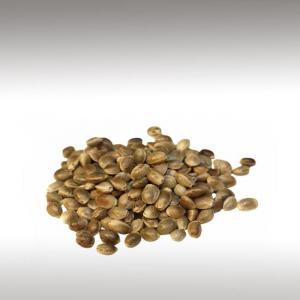

Cannabis Sativa is an annual herbaceous plant in the Cannabis genus, a species of the Cannabaceae family.
People have cultivated Cannabis Sativa throughout recorded history as a source of industrial fibre, seed oil, food, recreation, religious and spiritual moods, and medicine. Each part of the plant is harvested differently, depending on the purpose of its use.
The flowers of the female plant are arranged in racemes and can produce hundreds of seeds. Male plants shed their pollen and die several weeks prior to seed ripening on the female plants. Although genetic factors dispose a plant to become male or female, environmental factors including the diurnal light cycle can alter sexual expression.
Hemp oil or Hempseed oil is obtained by pressing Hemp seeds. Cold pressed, unrefined Hemp oil is dark to clear light green in color, with a nutty flavour. The darker the color, the grassier the flavour. It should not be confused with hash oil, a THC containing oil made from the cannabis flower, hailed by some for its medicinal qualities.
Hemp oil is extracted from the Hemp Seeds by means of a press. The press consists of a slowly rotating worm-shaft that squeezes out the majority of the oil and separates off the remaining seed matter known as the seed cake. The whole process is done in an oxygen-free environment in order to reduce oxidation.
The oil is of high nutritional value because of its 3:1 ratio of omega-6 to omega-3 essential fatty acids, which matches the balance required by the human body.
Hemp Seed oil is manufactured from varieties of Cannabis Sativa that do not contain significant amounts of THC, the psychoactive element present in the Cannabis plant. This manufacturing process typically includes cleaning the seed to 99.99% before pressing the oil. There is no THC within the Hemp Seed, although trace amounts of THC may be found in Hemp Seed oil when plant matter adheres to the seed surface during manufacturing.
About 30 - 35% of the weight of Hemp Seed is an edible oil that contains about 80% as essential fattyacids, linoleic acid,omega-6 ( 55%), alpha-linolenic acid, omega-3 ( 22%), in addition to gamma-linolenicacid, omega-6 (1 - 4%) and stearidonic acid, omega-3 ( 0 - 2%).
Hemp, (Cannabis Sativa), seed is a highly nutritious food, and contains anti-oxidants, protein, carotene, phytosterols, phospholipids, as well as a number of minerals including calcium, magnesium, sulfur, potassium, iron, zinc, and phosphorus. It is a source of complete protein and contains all twenty know amino acids, including the nineessential amino acids.
It also contains Vitamins A, B1, B2, B3, B6, C, D, and E. The green color in Hemp Seed oil is a result of the high level of chlorophyll which is naturally present in the seeds.
Hemp oil is a "drying oil", as it can polymerize into a solid form. Due to its polymer-forming properties, Hemp oil is used on its own or blended with other oils.
People have cultivated Cannabis Sativa throughout recorded history as a source of industrial fibre, seed oil, food, recreation, religious and spiritual moods, and medicine. Each part of the plant is harvested differently, depending on the purpose of its use.
The flowers of the female plant are arranged in racemes and can produce hundreds of seeds. Male plants shed their pollen and die several weeks prior to seed ripening on the female plants. Although genetic factors dispose a plant to become male or female, environmental factors including the diurnal light cycle can alter sexual expression.
Hemp oil or Hempseed oil is obtained by pressing Hemp seeds. Cold pressed, unrefined Hemp oil is dark to clear light green in color, with a nutty flavour. The darker the color, the grassier the flavour. It should not be confused with hash oil, a THC containing oil made from the cannabis flower, hailed by some for its medicinal qualities.
Hemp oil is extracted from the Hemp Seeds by means of a press. The press consists of a slowly rotating worm-shaft that squeezes out the majority of the oil and separates off the remaining seed matter known as the seed cake. The whole process is done in an oxygen-free environment in order to reduce oxidation.
The oil is of high nutritional value because of its 3:1 ratio of omega-6 to omega-3 essential fatty acids, which matches the balance required by the human body.
Hemp Seed oil is manufactured from varieties of Cannabis Sativa that do not contain significant amounts of THC, the psychoactive element present in the Cannabis plant. This manufacturing process typically includes cleaning the seed to 99.99% before pressing the oil. There is no THC within the Hemp Seed, although trace amounts of THC may be found in Hemp Seed oil when plant matter adheres to the seed surface during manufacturing.
About 30 - 35% of the weight of Hemp Seed is an edible oil that contains about 80% as essential fattyacids, linoleic acid,omega-6 ( 55%), alpha-linolenic acid, omega-3 ( 22%), in addition to gamma-linolenicacid, omega-6 (1 - 4%) and stearidonic acid, omega-3 ( 0 - 2%).
Hemp, (Cannabis Sativa), seed is a highly nutritious food, and contains anti-oxidants, protein, carotene, phytosterols, phospholipids, as well as a number of minerals including calcium, magnesium, sulfur, potassium, iron, zinc, and phosphorus. It is a source of complete protein and contains all twenty know amino acids, including the nineessential amino acids.
It also contains Vitamins A, B1, B2, B3, B6, C, D, and E. The green color in Hemp Seed oil is a result of the high level of chlorophyll which is naturally present in the seeds.
Hemp oil is a "drying oil", as it can polymerize into a solid form. Due to its polymer-forming properties, Hemp oil is used on its own or blended with other oils.
Submitted by OperaDreamhouse (August 1, 2014)
Borage Oil (Borago Officinalis) ☸ Base oils ☸ Food / Cooking
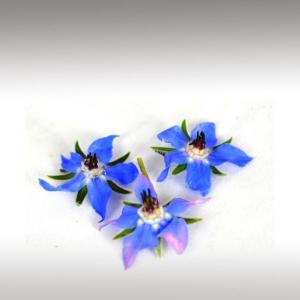

Borage (Borago officinalis) is an herb native to Syria that has spread throughout the Middle East and Mediterranean. Borage flowers and leaves may be eaten and borage seeds are often pressed to produce oil very high in gamma-linolenic acid (GLA).
Submitted by OperaDreamhouse (July 31, 2014)
Borage Oil (Borago Officinalis) ☸ Base oils ☸ Medicine / Health


Throughout history Borage has been used to treat a multitude of ailments and to improve overall health.
Borage seed oil has been used to treat skin disorders such as eczema, seborrheic dermatitis, and neurodermatitis. It has also been used for rheumatoid arthritis, stress, premenstrual syndrome, diabetes, attention deficit-hyperactivity disorder (ADHD), acute respiratory distress syndrome (ARDS), alcoholism, pain and swelling (inflammation), and for preventing heart disease and stroke.
Borage seed oil may therefore have anti-inflammatory and anti-thrombotic effects and it has been studied for its potential to treat anti-inflammatory disorders, atopic eczema, and respiratory inflammation.
Borage seed oil has one of the highest amounts of γ-linolenic acid (GLA) of seed oils, higher than Blackcurrant seed oil or Evening Primrose oil, to which it is considered similar. GLA comprises around 24% of the oil typically. GLA is converted to dihomo-gamma-linolenic acid, a precursor to a variety of the 1-series prostaglandins and the 3-series leukotrienes. It inhibits leukotriene synthesis to provide therapy in rheumatologic illness.
Borage oil may improve heart and lung function and reduce lung inflammation in acute respiratory distress syndrome. Preliminary evidence suggests that gamma linolenic acid (GLA) may have some immunosuppressant activity that may be helpful in reducing asthma symptoms. Borage oil is also used to increase breast milk production and to treat bronchitis and colds.
An essential fatty acid deficiency can directly affect mood, internal inflammation and various cellular functions. In order for metabolic processes such as cardiovascular functions to work properly, they depend on the proper levels of essential fatty acids in the body.
The adrenal glands in our body work very hard all day to prepare our body for fight or flight situations, constantly releasing adrenalin into the body. Adrenal fatigue can occur when the body is overstressed. Borage is used to restore the adrenal glands to their natural balance, which in turn creates a calmer body and mind.
Borage oil is a good herbal supplement for women because it contains high levels of calcium and iron, nutrients many women are deficient in. Potassium, Zinc, B and C Vitamins, and Beta carotene are packed into the Borage plant making it very nutritional. Borage is popularly used for premenstrual syndrome (PMS) and menopausal symptoms. Borage works well to ease the depression and mood swings often associated with menopause and menstrual cycles as well and is a nice alternative to traditional prescription medications.
Borage oil is often used to boost GLA deficiencies in children as well to ensure proper growth.
Preliminary evidence suggests that borage has anti-inflammatory effects that may make it beneficial in treating periodontitis (gum disease).
Hyperlipidemia is often associated with increased risk of heart disease and strokes. Gamma linolenic acid may decrease plasma triglyceride levels and increase HDL-cholesterol concentration. It is also used for stres, diabetes, attention deficit-hyperactivity disorder (ADHD), pain and swelling (inflammation), and for stroke.
Borage is also used for a hormone problem called adrenal insufficiency, for "blood purification," to increase urine flow.
Preliminary evidence indicated that borage oil may have some benefits in cystic fibrosis patients.
Borage oil have an antioxidant effect.
Borage oil may contain the pyrrolizidine alkaloid amabiline, which is hepatotoxic leading to a risk of liver damage. Borage oil may help treat or prevent alcohol-induced hangovers, although additional study is needed in this area.
Side effects:
Borage oil may be unsafe during pregnancy because preliminary studies suggest Borage oil has a teratogenic effect and that its prostaglandin E agonist action may cause premature labor.
Gamma linolenic acid supplementation may increase cognitive development, weight gain, and length gain, particularly in boys. Another study is needed to confirm these results.
It is not recommended to be taken long term internally due to the concentration of alkaloids in Borage that can damage the liver.
Do not take Borage if you are taking anti-coagulants without discussing it with your doctor first. Nausea, cramping, bloating and headache are side effects that Borage can cause, although they are relatively mild.
Although the liquid is not thought to be an irritant, direct contact with the eye may produce transient discomfort characterized by tearing or conjunctival redness (as with windburn).
Borage seed oil has been used to treat skin disorders such as eczema, seborrheic dermatitis, and neurodermatitis. It has also been used for rheumatoid arthritis, stress, premenstrual syndrome, diabetes, attention deficit-hyperactivity disorder (ADHD), acute respiratory distress syndrome (ARDS), alcoholism, pain and swelling (inflammation), and for preventing heart disease and stroke.
Borage seed oil may therefore have anti-inflammatory and anti-thrombotic effects and it has been studied for its potential to treat anti-inflammatory disorders, atopic eczema, and respiratory inflammation.
Borage seed oil has one of the highest amounts of γ-linolenic acid (GLA) of seed oils, higher than Blackcurrant seed oil or Evening Primrose oil, to which it is considered similar. GLA comprises around 24% of the oil typically. GLA is converted to dihomo-gamma-linolenic acid, a precursor to a variety of the 1-series prostaglandins and the 3-series leukotrienes. It inhibits leukotriene synthesis to provide therapy in rheumatologic illness.
Borage oil may improve heart and lung function and reduce lung inflammation in acute respiratory distress syndrome. Preliminary evidence suggests that gamma linolenic acid (GLA) may have some immunosuppressant activity that may be helpful in reducing asthma symptoms. Borage oil is also used to increase breast milk production and to treat bronchitis and colds.
An essential fatty acid deficiency can directly affect mood, internal inflammation and various cellular functions. In order for metabolic processes such as cardiovascular functions to work properly, they depend on the proper levels of essential fatty acids in the body.
The adrenal glands in our body work very hard all day to prepare our body for fight or flight situations, constantly releasing adrenalin into the body. Adrenal fatigue can occur when the body is overstressed. Borage is used to restore the adrenal glands to their natural balance, which in turn creates a calmer body and mind.
Borage oil is a good herbal supplement for women because it contains high levels of calcium and iron, nutrients many women are deficient in. Potassium, Zinc, B and C Vitamins, and Beta carotene are packed into the Borage plant making it very nutritional. Borage is popularly used for premenstrual syndrome (PMS) and menopausal symptoms. Borage works well to ease the depression and mood swings often associated with menopause and menstrual cycles as well and is a nice alternative to traditional prescription medications.
Borage oil is often used to boost GLA deficiencies in children as well to ensure proper growth.
Preliminary evidence suggests that borage has anti-inflammatory effects that may make it beneficial in treating periodontitis (gum disease).
Hyperlipidemia is often associated with increased risk of heart disease and strokes. Gamma linolenic acid may decrease plasma triglyceride levels and increase HDL-cholesterol concentration. It is also used for stres, diabetes, attention deficit-hyperactivity disorder (ADHD), pain and swelling (inflammation), and for stroke.
Borage is also used for a hormone problem called adrenal insufficiency, for "blood purification," to increase urine flow.
Preliminary evidence indicated that borage oil may have some benefits in cystic fibrosis patients.
Borage oil have an antioxidant effect.
Borage oil may contain the pyrrolizidine alkaloid amabiline, which is hepatotoxic leading to a risk of liver damage. Borage oil may help treat or prevent alcohol-induced hangovers, although additional study is needed in this area.
Side effects:
Borage oil may be unsafe during pregnancy because preliminary studies suggest Borage oil has a teratogenic effect and that its prostaglandin E agonist action may cause premature labor.
Gamma linolenic acid supplementation may increase cognitive development, weight gain, and length gain, particularly in boys. Another study is needed to confirm these results.
It is not recommended to be taken long term internally due to the concentration of alkaloids in Borage that can damage the liver.
Do not take Borage if you are taking anti-coagulants without discussing it with your doctor first. Nausea, cramping, bloating and headache are side effects that Borage can cause, although they are relatively mild.
Although the liquid is not thought to be an irritant, direct contact with the eye may produce transient discomfort characterized by tearing or conjunctival redness (as with windburn).
Submitted by OperaDreamhouse (July 31, 2014)
Borage Oil (Borago Officinalis) ☸ Base oils ☸ Beauty / Cosmetics


Suitable for sensitive, dry, combination, mature skin types.
Moisturizing to dry skin
Soothing to sensitive skin
Balances and tones combination skin.
Borago Officinalis, is one of the best choices for anti-aging, and wrinkle reducing, product lines where it offers regenerative, and firming, properties helping to restore hydration and elasticity. In the body, gamma linolenic acid is converted into prostaglandinl. Prostaglandinl helps heal inflammation of the skin and promotes skin health.
Borage oil is used for its rich natural source of gamma-Linolenic Acid (GLA), an important omega-6 fatty acid which is required for healthy skin cell membranes. Borage is applied to the skin for infantile seborrheic dermatitis and is also used in a dressing to soften the skin.
Borage Seed oil can aid in healing symptoms of dry and cracked skin.
Borage oil also improve hair and nail growth and appearance.
Moisturizing to dry skin
Soothing to sensitive skin
Balances and tones combination skin.
Borago Officinalis, is one of the best choices for anti-aging, and wrinkle reducing, product lines where it offers regenerative, and firming, properties helping to restore hydration and elasticity. In the body, gamma linolenic acid is converted into prostaglandinl. Prostaglandinl helps heal inflammation of the skin and promotes skin health.
Borage oil is used for its rich natural source of gamma-Linolenic Acid (GLA), an important omega-6 fatty acid which is required for healthy skin cell membranes. Borage is applied to the skin for infantile seborrheic dermatitis and is also used in a dressing to soften the skin.
Borage Seed oil can aid in healing symptoms of dry and cracked skin.
Borage oil also improve hair and nail growth and appearance.
Submitted by OperaDreamhouse (July 31, 2014)
Black Mustard Oil (Brassica Nigra) ☸ Base oils ☸ Medicine / Health
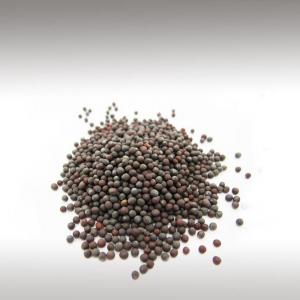

Mustard is used in the form of poultices for external application near the seat of inward inflammation, chiefly in pneumonia, bronchitis and other diseases of the respiratory organs. It relieves congestion of various organs by drawing the blood to the surface, as in head affections, and is of service in the alleviation of neuralgia and other pains and spasms ( Irritant, stimulant, diuretic, emetic). It is used in Ayurvedic practices too.
Black Mustard Seeds makes a stimulating footbath and helps to throw off a cold or dispel a headache. It also acts as an excellent fomentation. Including oils in the diet that are high in alpha-linolenic acid has been thought to protect the heart and to prevent cardiovascular disease. Use of Mustard oil in prevention of heart attack.
Evidence is conflicting as to whether Mustard oil is effective at lowering cholesterol levels or as to its beneficial effects as a massage agent in infants. At this time, high-quality human trials in support of the use of Mustard or Mustard oil for any indication are limited.
Mustard oil is rich in monounsaturated and polyunsaturated fats as well as omega-3 and omega-6 fatty acids. These acids balance the cholesterol levels by increasing good cholesterol or HDL and decreasing bad cholesterol or LDL, thus minimizing the risk of cardiovascular diseases.
Mustard has a long history of use. Traditionally, Mustard or Mustard oil have been used as a treatment for stomach and intestinal disorders and diabetes, as a natural antibacterial agent, to stimulate vomiting, and as a massage oil to improve blood circulation, muscular development, and skin texture.
Black Mustard oil is used for the common cold, painful joints and muscles (rheumatism), and arthritis. Mustard oil stimulates sensation in senseless organs and muscles. Thus, it acts as an irritant.
Mustard oil is an all-round tonic for health as it benefits all the systems operating in the body, provides strength and boosts immunity. it is effective in reducing skin inflammation and facilitates quick healing of cuts and wounds. Mustard oil has anti-bacterial properties as it is rich in glucosinolate which does not allow microbial presence. Thus, it prevents unwanted growth of bacteria, fungi and other deadly microbes.
This oil is beneficial for those who are prone to cold and cough as it helps clear the congestion of chest and nose. One teaspoon of honey and Mustard oil thrice a day. These remedies are effective in controlling asthma. Mustard oil is considered a natural remedy for asthma and sinusitis. In case of an asthma attack.
The strong aroma of Mustard oil will warm up the respiratory system, thus providing protection against the formation and build-up of phlegm.
Mustard oil acts as a powerful stimulant by stimulating the digestive, circulatory and excretory system. It aids in digestion by stimulating the secretion of digestive juices and bile from spleen and liver, which increase the peristaltic movement of food. Massaging the oil externally stimulates blood circulation and sweat glands, thus lowering the body temperature.
Good health depends upon a healthy appetite to a great extent. Mustard oil acts as an appetizer by stimulating the gastric juices in the stomach. It increases hunger by irritating the intestinal lining. Thus, those having poor appetite can consider using it as cooking oil. Mustard oil helps in digestion. Mustard oil helps in activating various digestive enzymes and stimulates production of gastric juices.
Reduces the risk of cancer. Protects from gastrointestinal cancer: Packed with phytonutrients, Mustard Seeds are a great way to prevent and slow the progress of cancers of the gastrointestinal tract.
Mustard oil is an effective mosquito repellent as it can deter insects with its sharp aroma. Thus, it helps in preventing malaria and other insect-borne diseases.
Side effects:
Oil of Mustard is a powerful irritant and rubefacient, and when applied to the skin in its pure state, produces almost instant vesication. Black Mustard contains chemicals that might initially reduce pain when applied to the skin. But contact with the skin for too long might cause skin irritation and burning.
If your skin is sensitive and hypoallergenic, its best not to use the oil. High doses injected or applied topically can cause irritation and inflammation.
Black Mustard Seeds makes a stimulating footbath and helps to throw off a cold or dispel a headache. It also acts as an excellent fomentation. Including oils in the diet that are high in alpha-linolenic acid has been thought to protect the heart and to prevent cardiovascular disease. Use of Mustard oil in prevention of heart attack.
Evidence is conflicting as to whether Mustard oil is effective at lowering cholesterol levels or as to its beneficial effects as a massage agent in infants. At this time, high-quality human trials in support of the use of Mustard or Mustard oil for any indication are limited.
Mustard oil is rich in monounsaturated and polyunsaturated fats as well as omega-3 and omega-6 fatty acids. These acids balance the cholesterol levels by increasing good cholesterol or HDL and decreasing bad cholesterol or LDL, thus minimizing the risk of cardiovascular diseases.
Mustard has a long history of use. Traditionally, Mustard or Mustard oil have been used as a treatment for stomach and intestinal disorders and diabetes, as a natural antibacterial agent, to stimulate vomiting, and as a massage oil to improve blood circulation, muscular development, and skin texture.
Black Mustard oil is used for the common cold, painful joints and muscles (rheumatism), and arthritis. Mustard oil stimulates sensation in senseless organs and muscles. Thus, it acts as an irritant.
Mustard oil is an all-round tonic for health as it benefits all the systems operating in the body, provides strength and boosts immunity. it is effective in reducing skin inflammation and facilitates quick healing of cuts and wounds. Mustard oil has anti-bacterial properties as it is rich in glucosinolate which does not allow microbial presence. Thus, it prevents unwanted growth of bacteria, fungi and other deadly microbes.
This oil is beneficial for those who are prone to cold and cough as it helps clear the congestion of chest and nose. One teaspoon of honey and Mustard oil thrice a day. These remedies are effective in controlling asthma. Mustard oil is considered a natural remedy for asthma and sinusitis. In case of an asthma attack.
The strong aroma of Mustard oil will warm up the respiratory system, thus providing protection against the formation and build-up of phlegm.
Mustard oil acts as a powerful stimulant by stimulating the digestive, circulatory and excretory system. It aids in digestion by stimulating the secretion of digestive juices and bile from spleen and liver, which increase the peristaltic movement of food. Massaging the oil externally stimulates blood circulation and sweat glands, thus lowering the body temperature.
Good health depends upon a healthy appetite to a great extent. Mustard oil acts as an appetizer by stimulating the gastric juices in the stomach. It increases hunger by irritating the intestinal lining. Thus, those having poor appetite can consider using it as cooking oil. Mustard oil helps in digestion. Mustard oil helps in activating various digestive enzymes and stimulates production of gastric juices.
Reduces the risk of cancer. Protects from gastrointestinal cancer: Packed with phytonutrients, Mustard Seeds are a great way to prevent and slow the progress of cancers of the gastrointestinal tract.
Mustard oil is an effective mosquito repellent as it can deter insects with its sharp aroma. Thus, it helps in preventing malaria and other insect-borne diseases.
Side effects:
Oil of Mustard is a powerful irritant and rubefacient, and when applied to the skin in its pure state, produces almost instant vesication. Black Mustard contains chemicals that might initially reduce pain when applied to the skin. But contact with the skin for too long might cause skin irritation and burning.
If your skin is sensitive and hypoallergenic, its best not to use the oil. High doses injected or applied topically can cause irritation and inflammation.
Submitted by OperaDreamhouse (July 23, 2014)
Black Mustard Oil (Brassica Nigra) ☸ Base oils ☸ Beauty / Cosmetics


Mustard oil is extremely beneficial for skin and is often used in aroma therapy treatments. However, before applying it topically, it is advisable to do patch a test to ensure that you are not allergic to it.
Due to its thick consistency and high levels of Vitamin E, topical application of this oil protects skin against the harsh ultraviolet rays and other pollutants, thus preventing skin cancer. Vitamin E prevents ageing and wrinkles besides acting as a sunshield.
Due to its anti-bacterial and anti-fungal properties, Mustard oil is effective in treating rashes and other skin infections, thus preventing skin from dryness, dullness and itching.
A body massage with Mustard oil rejuvenates and cleans skin by increasing blood circulation. Whether consumed or applied topically, Mustard oil stimulates the sweat glands and opens the pores of the skin. Thus, it helps in reducing the body temperature and removes unwanted toxins, water and salts from the body.
Mustard oil is effective in removing tan and dark spots to give you a naturally glowing skin. Lightens the skin.
It is known to prevent hair loss and promote hair growth:
Mustard oil acts as a hair vitalizer to combat hair loss and baldness as well as treat dry and damaged hair. It prevents scalp infections by inhibiting fungal growth and keeping it hydrated. Massaging scalp with Mustard oil stimulates hair growth by increasing blood circulation in the scalp.
Mustard oil is a great remedy for dry chapped lips.
Due to its thick consistency and high levels of Vitamin E, topical application of this oil protects skin against the harsh ultraviolet rays and other pollutants, thus preventing skin cancer. Vitamin E prevents ageing and wrinkles besides acting as a sunshield.
Due to its anti-bacterial and anti-fungal properties, Mustard oil is effective in treating rashes and other skin infections, thus preventing skin from dryness, dullness and itching.
A body massage with Mustard oil rejuvenates and cleans skin by increasing blood circulation. Whether consumed or applied topically, Mustard oil stimulates the sweat glands and opens the pores of the skin. Thus, it helps in reducing the body temperature and removes unwanted toxins, water and salts from the body.
Mustard oil is effective in removing tan and dark spots to give you a naturally glowing skin. Lightens the skin.
It is known to prevent hair loss and promote hair growth:
Mustard oil acts as a hair vitalizer to combat hair loss and baldness as well as treat dry and damaged hair. It prevents scalp infections by inhibiting fungal growth and keeping it hydrated. Massaging scalp with Mustard oil stimulates hair growth by increasing blood circulation in the scalp.
Mustard oil is a great remedy for dry chapped lips.
Submitted by OperaDreamhouse (July 23, 2014)
Black Mustard Oil (Brassica Nigra) ☸ Base oils ☸ Spiritual Practises


This oil forms a part and parcel of Indian tradition and culture. It is used for lighting "diyas" in Diwali as well as in rituals performed in North Indian weddings.
Black Mustard oil in Ayurveda medicine recommends for Kappa-type massage oil.
Black Mustard is thought to be the seed mentioned by Jesus in Matthew 13:31-32.
Black Mustard oil in Ayurveda medicine recommends for Kappa-type massage oil.
Black Mustard is thought to be the seed mentioned by Jesus in Matthew 13:31-32.
Submitted by OperaDreamhouse (July 23, 2014)
Acai Berry Oil (Euterpe Oleracea) ☸ Base oils ☸ Food / Cooking
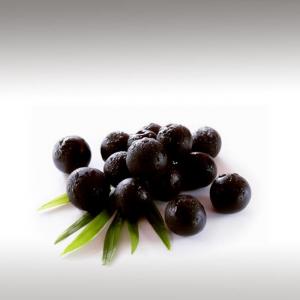

There are also many other Vitamins such as B1, B2, B3, E, and C, minerals such as phosphorus, calcium, and potassium, as well as polyphenols, anthocyanins, and phytosterols.
Submitted by OperaDreamhouse (July 23, 2014)
Acai Berry Oil (Euterpe Oleracea) ☸ Base oils ☸ Medicine / Health


Acai is very high in Vitamin C and ellagic acid, an immune-system-boosting combination that has been shown to suppress the growth of cancer.
One study published in the Journal of Agriculture and Food Chemistry found that polyphenolic compounds extracted from Acai reduced cancer cell proliferation by 56-86%. It is thought that Acai's phytochemcials can stop the process of carcinogenesis on a molecular level, killing off tumorous cells before they multiply.
Acai Berries are not a cure for cancer: but hopefully more research will examine their benefits and potential role in the fight. Studies have revealed that the phenols contains in Acai Berry oil help protect against the damage of free-radicals and may help destroy and protect against cancer cell formation.
It is a highly beneficial ingredient in formulations intended to treat acne, reduce swelling and ease muscular aches and pains.
Acai Berry oil helps damaged skin like eczema and psoriasis. It helps heal dry and cracked skin. It is good oil for face and neck treatments and may even help to reduce wrinkling.
Due its overall health benefits, taking Acai oil can lead to an increased overall level of energy and stamina, and may aid to combat fatigue and exhaustion
This famous red berry has also been linked to overall increased blood circulation in the human body, a phenomenon that may contribute to a boost in sex drive, especially for men. Preliminary research studies show that Acai may prevent mental imbalance in menopausal women.
Stable sources of Vitamin C for use in skin care are rare. While Vitamin C is famous for it's support of our body's immune system, it is also known to help rejuvenate and revitalize the skin by encouraging cell regeneration. Due to the Acais antioxidant content, the Acai Berry also has a natural anti-inflammatory effect, making it a useful ingredient for treating acne.
It has also been suggested that Acai Berry can help ease pain caused by damaged nerve fibres.
Acai Berry oil associated with the ability to lower cholesterol levels in the blood stream. They are also rich in plant sterols that provide cardio-protective benefits to our cells. It does this by preventing blood clots, improving overall blood circulation, and relaxing the blood vessels.
Acai Berry oil is powerful antioxidant. Studies have revealed that the phenols contained in Acai Berry oil help protect against the damage of free-radicals and may help destroy and protect against cancer cell formation.
One study published in the Journal of Agriculture and Food Chemistry found that polyphenolic compounds extracted from Acai reduced cancer cell proliferation by 56-86%. It is thought that Acai's phytochemcials can stop the process of carcinogenesis on a molecular level, killing off tumorous cells before they multiply.
Acai Berries are not a cure for cancer: but hopefully more research will examine their benefits and potential role in the fight. Studies have revealed that the phenols contains in Acai Berry oil help protect against the damage of free-radicals and may help destroy and protect against cancer cell formation.
It is a highly beneficial ingredient in formulations intended to treat acne, reduce swelling and ease muscular aches and pains.
Acai Berry oil helps damaged skin like eczema and psoriasis. It helps heal dry and cracked skin. It is good oil for face and neck treatments and may even help to reduce wrinkling.
Due its overall health benefits, taking Acai oil can lead to an increased overall level of energy and stamina, and may aid to combat fatigue and exhaustion
This famous red berry has also been linked to overall increased blood circulation in the human body, a phenomenon that may contribute to a boost in sex drive, especially for men. Preliminary research studies show that Acai may prevent mental imbalance in menopausal women.
Stable sources of Vitamin C for use in skin care are rare. While Vitamin C is famous for it's support of our body's immune system, it is also known to help rejuvenate and revitalize the skin by encouraging cell regeneration. Due to the Acais antioxidant content, the Acai Berry also has a natural anti-inflammatory effect, making it a useful ingredient for treating acne.
It has also been suggested that Acai Berry can help ease pain caused by damaged nerve fibres.
Acai Berry oil associated with the ability to lower cholesterol levels in the blood stream. They are also rich in plant sterols that provide cardio-protective benefits to our cells. It does this by preventing blood clots, improving overall blood circulation, and relaxing the blood vessels.
Acai Berry oil is powerful antioxidant. Studies have revealed that the phenols contained in Acai Berry oil help protect against the damage of free-radicals and may help destroy and protect against cancer cell formation.
Submitted by OperaDreamhouse (July 23, 2014)
Acai Berry Oil (Euterpe Oleracea) ☸ Base oils ☸ Beauty / Cosmetics


Suitable for all skin types (especially for dry or mature aging skin).
Acai Berry carrier oil helps damaged skin like eczema and psoriasis. It helps heal dry and cracked skin. It is good oil for face and neck treatments and may even help to reduce wrinkling. The Acai Berry has very large seed content. These seeds are gathered and then pressed into natural green oil. The cold pressed oil has a very high antioxidant value and can be applied topically to the skin.
Sunlight, cigarette smoking, polluted air and the intake of pesticides. These substances damage the skin cells creating what is called “free radicals". The Acai Berry has high levels of Vitamin C, poly phenols and anthocyanins (flavonoids) each of which are powerful antioxidants. Damage from UV rays, environmental pollution and aging can all benefit from acai oil, moisturizer and other forms of cosmetics.
Acai oil makes a wonderful choice for anti-aging formulations such as masks, serums, cleansers, and creams. Due to its high antioxidant value it also makes a great addition to sensitive skin products. Berry carrier oil helps to heal dry, chapped and cracked skin, balances the moisture in skin, and it conditions hair well.
It helps to remove toxic build-up in the skin, improving the skin's complexion. Acai Berry oil does not clog pores.
Acai oil is highly emollient and is an effective moisturizing oil for products intended to heal dry and cracked skin, eczema and psoriasis. This oil penetrates the skin quickly, acting as an excellent emollient carrier oil.
Hyper pigmentation is a common, usually harmless condition in which patches of skin become darker in colour than the normal surrounding skin. This darkening occurs when an excess of melanin, the brown pigment that produces normal skin colour, forms deposits in the skin. Research by Fowler et al (2010) found Acai Berry to be one of the most beneficial natural ingredients for the treatment of hyperpigmentation.
Acai Berry oil applied into the scalp will encourage healthy hair growth, and when rubbed into the ends of the hair, will help to repair split ends.
Acai Berry carrier oil helps damaged skin like eczema and psoriasis. It helps heal dry and cracked skin. It is good oil for face and neck treatments and may even help to reduce wrinkling. The Acai Berry has very large seed content. These seeds are gathered and then pressed into natural green oil. The cold pressed oil has a very high antioxidant value and can be applied topically to the skin.
Sunlight, cigarette smoking, polluted air and the intake of pesticides. These substances damage the skin cells creating what is called “free radicals". The Acai Berry has high levels of Vitamin C, poly phenols and anthocyanins (flavonoids) each of which are powerful antioxidants. Damage from UV rays, environmental pollution and aging can all benefit from acai oil, moisturizer and other forms of cosmetics.
Acai oil makes a wonderful choice for anti-aging formulations such as masks, serums, cleansers, and creams. Due to its high antioxidant value it also makes a great addition to sensitive skin products. Berry carrier oil helps to heal dry, chapped and cracked skin, balances the moisture in skin, and it conditions hair well.
It helps to remove toxic build-up in the skin, improving the skin's complexion. Acai Berry oil does not clog pores.
Acai oil is highly emollient and is an effective moisturizing oil for products intended to heal dry and cracked skin, eczema and psoriasis. This oil penetrates the skin quickly, acting as an excellent emollient carrier oil.
Hyper pigmentation is a common, usually harmless condition in which patches of skin become darker in colour than the normal surrounding skin. This darkening occurs when an excess of melanin, the brown pigment that produces normal skin colour, forms deposits in the skin. Research by Fowler et al (2010) found Acai Berry to be one of the most beneficial natural ingredients for the treatment of hyperpigmentation.
Acai Berry oil applied into the scalp will encourage healthy hair growth, and when rubbed into the ends of the hair, will help to repair split ends.
Submitted by OperaDreamhouse (July 23, 2014)
Evening Primrose Oil (Oenothera Biennis) ☸ Base oils ☸ Medicine / Health
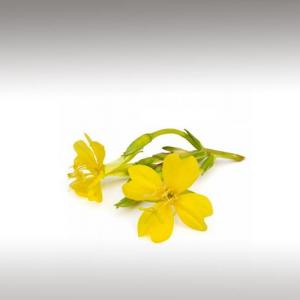

Evening Primrose oil has been called the most sensational preventive discovery since Vitamin C. It contains the pain relieving compound phenylalanine and is increasingly being used to treat chronic headaches. It is currently being studied all over the world as a treatment for aging problems, alcoholism, acne, heart disease, hyperactivity in children, symptoms of menopause, multiple sclerosis, weight control, obesity, PMS and schizophrenia.
Research indicates that the GLA (The gamma-linoleic acid) in Evening Primrose oil can help prevent, and in some cases even reverse, the nerve damage (neuropathy) so commonly seen with diabetes.
In a year-long study, such symptoms as numbness, tingling, and loss of sensation in participants with mild diabetic neuropathy were less marked in those who took Evening Pimrose oil than in those who took a placebo.
A study by the Highland Psychiatric Research Group at the Draig Dunain Hospital, Inverness, Scotland, found that Evening Primrose encouraged regeneration of liver cells damaged by alcohol consumption. Other researchers think it may also prevent alcoholic poisoning, hangovers, postdrink depression and alcohol withdrawal. It is thought to stop alcohol from damaging brain cells by bolstering them with unsaturated fats.
By working to dilute sebum, a thick oily substance that is oversecreted in some people with acne, the essential fatty acids in Evening Primrose oil may reduce the risk of pores becoming clogged and lesions developing. The oil's EFAs help treat rosacea by reducing inflammation, controlling cells use of nutrients and by producing prostaglandins, which stimulate the contraction of blood vessels.
It may also minimise premenstrual breast tenderness, irritable bowel flare-ups, and carbohydrate cravings, and help to control endometriosis-associated inflammation. Many PMS sufferers are found to have unusually low levels of GLA in their systems, which is why supplements might help so much.
In women with fibrocystic breasts, the oil's essential fatty acids can minimise breast inflammation and promote the absorption of iodine, a mineral that can be present in abnormally low levels in women with this condition. By interfering with the production of inflammatory prostaglandins released during menstruation, the GLA in Evening Primrose oil can help to lessen menstrual cramps.
Women use Evening Primrose oil in pregnancy for preventing high blood pressure (pre-eclampsia), shortening labor, starting labor, and preventing late deliveries.
Women also use Evening Primrose oil for premenstrual syndrome (PMS), breast pain, endometriosis, and symptoms of menopause such as hot flashes.
Possibly effective for osteoporosis, when used in combination with calcium and Fish oils. There is some early evidence that a specific combination of Evening Primrose oil and Fish oils (Efamarine) might reduce the symptoms of CFS.
Some people use Evening Primrose oil for chronic fatigue syndrome, asthma, nerve damage related to diabetes, an itching disorder called neurodermatitis, hyperactivity in children and attention deficit-hyperactivity disorder (ADHD), obesity and weight loss, whooping cough and gastrointestinal disorders including ulcerative colitis, irritable bowel syndrome, and peptic ulcer disease.
By boosting the transmission of nerve impulses, Evening Primrose oil may be valuable in treating this progressive brain disorder (Alzheimer).
By promoting blood flow, the GLA in Evening Primrose oil can help treat a primary cause of male impotence; compromised circulation leading to impaired penile blood flow. The oil is often taken with Vitamin C and Ginkgo Biloba for this purpose.
By improving uterine function, GLA may also help those who are unable to conceive.
Complications of pregnancy: Research to date suggests that taking Evening Primrose oil doesn't seem to shorten labor, prevent high blood pressure (pre-eclampsia), or prevent late deliveries in pregnant women.
GLA (The gamma-linoleic acid) prompts the brain to produce a specific type of prostaglandin called prostaglandin E, which works to prevent withdrawal symptoms such as depression and seizures by indirectly protecting the liver and nervous system.
In animal studies, gamma-linolenic acid (an ingredient of Evening Primrose oil) is reported to lower blood pressure. Therefore, in theory, Evening Primrose oil may have effects on blood pressure, and should be used cautiously when combined with other agents that may lower blood pressure.
Sjogren's syndrome (an autoimmune disorder in which certain body cells attack and destroy the glands that produce tears and saliva).
Research indicates that the GLA (The gamma-linoleic acid) in Evening Primrose oil can help prevent, and in some cases even reverse, the nerve damage (neuropathy) so commonly seen with diabetes.
In a year-long study, such symptoms as numbness, tingling, and loss of sensation in participants with mild diabetic neuropathy were less marked in those who took Evening Pimrose oil than in those who took a placebo.
A study by the Highland Psychiatric Research Group at the Draig Dunain Hospital, Inverness, Scotland, found that Evening Primrose encouraged regeneration of liver cells damaged by alcohol consumption. Other researchers think it may also prevent alcoholic poisoning, hangovers, postdrink depression and alcohol withdrawal. It is thought to stop alcohol from damaging brain cells by bolstering them with unsaturated fats.
By working to dilute sebum, a thick oily substance that is oversecreted in some people with acne, the essential fatty acids in Evening Primrose oil may reduce the risk of pores becoming clogged and lesions developing. The oil's EFAs help treat rosacea by reducing inflammation, controlling cells use of nutrients and by producing prostaglandins, which stimulate the contraction of blood vessels.
It may also minimise premenstrual breast tenderness, irritable bowel flare-ups, and carbohydrate cravings, and help to control endometriosis-associated inflammation. Many PMS sufferers are found to have unusually low levels of GLA in their systems, which is why supplements might help so much.
In women with fibrocystic breasts, the oil's essential fatty acids can minimise breast inflammation and promote the absorption of iodine, a mineral that can be present in abnormally low levels in women with this condition. By interfering with the production of inflammatory prostaglandins released during menstruation, the GLA in Evening Primrose oil can help to lessen menstrual cramps.
Women use Evening Primrose oil in pregnancy for preventing high blood pressure (pre-eclampsia), shortening labor, starting labor, and preventing late deliveries.
Women also use Evening Primrose oil for premenstrual syndrome (PMS), breast pain, endometriosis, and symptoms of menopause such as hot flashes.
Possibly effective for osteoporosis, when used in combination with calcium and Fish oils. There is some early evidence that a specific combination of Evening Primrose oil and Fish oils (Efamarine) might reduce the symptoms of CFS.
Some people use Evening Primrose oil for chronic fatigue syndrome, asthma, nerve damage related to diabetes, an itching disorder called neurodermatitis, hyperactivity in children and attention deficit-hyperactivity disorder (ADHD), obesity and weight loss, whooping cough and gastrointestinal disorders including ulcerative colitis, irritable bowel syndrome, and peptic ulcer disease.
By boosting the transmission of nerve impulses, Evening Primrose oil may be valuable in treating this progressive brain disorder (Alzheimer).
By promoting blood flow, the GLA in Evening Primrose oil can help treat a primary cause of male impotence; compromised circulation leading to impaired penile blood flow. The oil is often taken with Vitamin C and Ginkgo Biloba for this purpose.
By improving uterine function, GLA may also help those who are unable to conceive.
Complications of pregnancy: Research to date suggests that taking Evening Primrose oil doesn't seem to shorten labor, prevent high blood pressure (pre-eclampsia), or prevent late deliveries in pregnant women.
GLA (The gamma-linoleic acid) prompts the brain to produce a specific type of prostaglandin called prostaglandin E, which works to prevent withdrawal symptoms such as depression and seizures by indirectly protecting the liver and nervous system.
In animal studies, gamma-linolenic acid (an ingredient of Evening Primrose oil) is reported to lower blood pressure. Therefore, in theory, Evening Primrose oil may have effects on blood pressure, and should be used cautiously when combined with other agents that may lower blood pressure.
Sjogren's syndrome (an autoimmune disorder in which certain body cells attack and destroy the glands that produce tears and saliva).
Submitted by OperaDreamhouse (July 22, 2014)
Evening Primrose Oil (Oenothera Biennis) ☸ Base oils ☸ Beauty / Cosmetics


Suitable for sensitive, oily, mature skin types.
The oil from the seed is added to toiletries and cosmetics. It is often combined with Vitamin E to prevent oxidation. And a finely ground powder made from the flowering stems is used cosmetically in face-masks to counteract reddened skins.
The rich stores of essential fatty acids in Evening Primrose oil not only prevent nails from cracking but also help to keep them generally healthy. In addition, the essential fatty acids nourish the scalp, making the supplement potentially valuable in treating a variety of hair problems.
The fatty acids in the oil are extremely moisturizing, helping to keep dry areas hydrated. It also reportedly improves blood circulation wherever it is applied, making it a natural way to treat tired skin and eyes. It also helps reduce inflammation and keeps pores clear. Even those who do not have serious skin conditions may want to use this oil to as a daily facial treatment.
Since Primrose oil has high concentrations of antioxidants, it aids in fighting free radicals. Pollution, stress and sun exposure may cause irreparable damage to the skin by formation of free radicals. It is extremely necessary to neutralize the free radicals as they may cause the skin to look tired and weary. Antioxidants help in fighting such radicals and make skin free from any damage. Primrose oil thus revitalizes the skin cells making it look fresh and healthy.
Primrose oil helps in adding moisture to the skin and promoting healthy maintenance of collagen, it improves skin elasticity and prevents premature sagging as well as wrinkles and fine lines.
Many factors tend to damage the skin cells which make the skin dull and patchy due to deposition of dead skin cells. Therefore, there should be continuous production and repair of new cells to replace the old ones. Primrose oil helps in regeneration of new cells as well as repairing of damaged cells to provide you with an everlasting glow from within.
It reduces infection and bacterial growth on the skin thereby shrinking the acne. Regular use may even protect your skin from the formation of acne. The emollient properties of Primrose oil help in keeping skin free from dryness, which is a major cause of acne and blemishes. Key herb for treating eczema.
Dark circles are probably the most common skin issue faced by a huge number of individuals. Though there can be many causes for such skin condition, for example, excessive exposure to the sun, hyper-pigmentation, stress and anxiety; Primrose oil may help in providing an even toned skin texture by slowly fading the uneven dark under eye areas. Cures hyper-pigmentation.
Primrose oil has omega-6 fatty acids which nourish the hair well. It retains moisture of the hair shaft, thereby reducing damage. Since Primrose oil has high amounts of GLA or the essential fatty acids, it prevents hair from becoming excessively dry, especially near the ends of the hair shaft. It improves hair texture throughout the shaft and provides sheen to your hair. Reduces hair brittleness.
The oil from the seed is added to toiletries and cosmetics. It is often combined with Vitamin E to prevent oxidation. And a finely ground powder made from the flowering stems is used cosmetically in face-masks to counteract reddened skins.
The rich stores of essential fatty acids in Evening Primrose oil not only prevent nails from cracking but also help to keep them generally healthy. In addition, the essential fatty acids nourish the scalp, making the supplement potentially valuable in treating a variety of hair problems.
The fatty acids in the oil are extremely moisturizing, helping to keep dry areas hydrated. It also reportedly improves blood circulation wherever it is applied, making it a natural way to treat tired skin and eyes. It also helps reduce inflammation and keeps pores clear. Even those who do not have serious skin conditions may want to use this oil to as a daily facial treatment.
Since Primrose oil has high concentrations of antioxidants, it aids in fighting free radicals. Pollution, stress and sun exposure may cause irreparable damage to the skin by formation of free radicals. It is extremely necessary to neutralize the free radicals as they may cause the skin to look tired and weary. Antioxidants help in fighting such radicals and make skin free from any damage. Primrose oil thus revitalizes the skin cells making it look fresh and healthy.
Primrose oil helps in adding moisture to the skin and promoting healthy maintenance of collagen, it improves skin elasticity and prevents premature sagging as well as wrinkles and fine lines.
Many factors tend to damage the skin cells which make the skin dull and patchy due to deposition of dead skin cells. Therefore, there should be continuous production and repair of new cells to replace the old ones. Primrose oil helps in regeneration of new cells as well as repairing of damaged cells to provide you with an everlasting glow from within.
It reduces infection and bacterial growth on the skin thereby shrinking the acne. Regular use may even protect your skin from the formation of acne. The emollient properties of Primrose oil help in keeping skin free from dryness, which is a major cause of acne and blemishes. Key herb for treating eczema.
Dark circles are probably the most common skin issue faced by a huge number of individuals. Though there can be many causes for such skin condition, for example, excessive exposure to the sun, hyper-pigmentation, stress and anxiety; Primrose oil may help in providing an even toned skin texture by slowly fading the uneven dark under eye areas. Cures hyper-pigmentation.
Primrose oil has omega-6 fatty acids which nourish the hair well. It retains moisture of the hair shaft, thereby reducing damage. Since Primrose oil has high amounts of GLA or the essential fatty acids, it prevents hair from becoming excessively dry, especially near the ends of the hair shaft. It improves hair texture throughout the shaft and provides sheen to your hair. Reduces hair brittleness.
Submitted by OperaDreamhouse (July 22, 2014)
Wheatgerm Oil (Triticum Vulgare) ☸ Base oils ☸ Food / Cooking
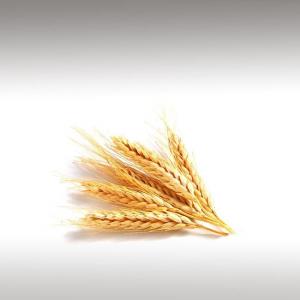

Wheat is one of the oldest cultivated plants and its history can be
traced back 10,000 years. Wheat crops became very important to the
Romans, as their empire grew, so did the spread of wheat as a food
staple.
Wheatgerm oil is yellow or reddish in colour with a nutty taste and it is nutritionally one of the densest substances in the plant world.
Wheatgerm oil is yellow or reddish in colour with a nutty taste and it is nutritionally one of the densest substances in the plant world.
Wheat germ oil is also very high in Vitamin E and has the highest
content of Vitamin E of any food that has not undergone prior
preparation or vitamin fortification.
As a cooking oil, Wheatgerm oil
is strongly flavored, expensive and easily perishable.
Wheatgerm oil can be taken alone, drizzled on top of salads, vegetables, pasta, pesto, or other meals.
Wheatgerm oil can be taken alone, drizzled on top of salads, vegetables, pasta, pesto, or other meals.
Wheatgerm oil should not be
heated. Wheatgerm oil is used in pasta, oatmeal and cereals to add
taste.
It cinsists of more nutrients than any grain oil and can added in baby food. The oil can also be added to smoothies for extra nutrition.
It cinsists of more nutrients than any grain oil and can added in baby food. The oil can also be added to smoothies for extra nutrition.
Wheat germ oil can also be found in edible products including chocolate, and other processed products.
Wheat was grown in prehistoric times, probably six to seven
thousand years ago.
Evidence of its cultivation has been found in
Europe, England, Egypt and China. The history of wheat dates back to
7000 B.C. Research has proved that Wheat was found in some of the world's oldest excavations in eastern Iraq.
The oil is taken out from the germ of the wheat. The germ forms only 2,5% of the weight of a wheat grain; nonetheless, contains about 25% of the protein, vitamins and minerals.
Triticum Vulgare oil has a shelf life of near about 6 - 8 months
The oil is taken out from the germ of the wheat. The germ forms only 2,5% of the weight of a wheat grain; nonetheless, contains about 25% of the protein, vitamins and minerals.
Triticum Vulgare oil has a shelf life of near about 6 - 8 months
Submitted by OperaDreamhouse (July 22, 2014)
Evening Primrose Oil (Oenothera Biennis) ☸ Base oils ☸ Spiritual Practises


Some Evening Primrose seeds have been shown to live to 80 years in the soil.
Hunters are said to have rubbed the root on the soles of their mocassins to mask their smell and get closer to the animals. Herb for a successful hunt.
Hunters are said to have rubbed the root on the soles of their mocassins to mask their smell and get closer to the animals. Herb for a successful hunt.
Submitted by OperaDreamhouse (July 22, 2014)
Wheatgerm Oil (Triticum Vulgare) ☸ Base oils ☸ Beauty / Cosmetics


Suitable for sensitive, dry, mature, damaged skin types.
Wheatgerm is beneficial for healthy hair and skin because of the large quantities of Vitamin E.
Wheatgerm is beneficial for healthy hair and skin because of the large quantities of Vitamin E.
Vitamin E is a powerful antioxidant that protects skin cells from ultra-violet light and environmental stress. The Vitamin E oil present in Wheatgerm oil promotes skin cell formation, and is great for nourishing and rejuvenating dry, mature, dehydrated skin, and reducing scars, stretch marks, sunburns, and damaged skin.
It is naturally rich in Vitamins A, D, and E, and also contains vitamins B1, B2, B3, B6, F, essential fatty acids, protein, and minerals.
It is naturally rich in Vitamins A, D, and E, and also contains vitamins B1, B2, B3, B6, F, essential fatty acids, protein, and minerals.
Because of its anti-oxidant and regenerative properties, Wheatgerm oil is a wonderful ingredient to add to body care and cosmetic products.
The high Vitamin E content in Wheatgerm oil is a natural preservative, helps to prevent rancidity, and prolongs the shelf life of cosmetic products.
This ultra rich, unrefined Wheatgerm oil is a great ingredient, and has been applied externally for numerous irritations including roughness of the skin, cracking, and chaffing.
The germ oil lets your skin have natural strength so that is guarded from skin irritation and other disorders. it helps to promote a smoother, younger looking skin, assisting in healing scar tissue as well as stretch marks. It protects stretch marks, sunburns and skin damages.
Wheatgerm carrier oil is often used in combination with other carrier oils in order to extend shelf lives. Wheatgerm oil leaves an oily feeling on the skin, and should be used in dilution with other carrier oils for best results. Many crafters of cosmetics use it successfully to help reverse the effects of wrinkling.
For massage oil blends, it is recommended that you incorporate 10 - 15%. The dark color and heavy odor must be considered before using it. Its mineral content includes phosphorus, zinc, iron, sulphur, and potassium, which makes it a highly nutritive ingredient and nourishes your skin.
Included in the diet Wheatgerm oil also nourish and help to maintain healthy skin, nails and hair.
The high Vitamin E content in Wheatgerm oil is a natural preservative, helps to prevent rancidity, and prolongs the shelf life of cosmetic products.
This ultra rich, unrefined Wheatgerm oil is a great ingredient, and has been applied externally for numerous irritations including roughness of the skin, cracking, and chaffing.
The germ oil lets your skin have natural strength so that is guarded from skin irritation and other disorders. it helps to promote a smoother, younger looking skin, assisting in healing scar tissue as well as stretch marks. It protects stretch marks, sunburns and skin damages.
Wheatgerm carrier oil is often used in combination with other carrier oils in order to extend shelf lives. Wheatgerm oil leaves an oily feeling on the skin, and should be used in dilution with other carrier oils for best results. Many crafters of cosmetics use it successfully to help reverse the effects of wrinkling.
For massage oil blends, it is recommended that you incorporate 10 - 15%. The dark color and heavy odor must be considered before using it. Its mineral content includes phosphorus, zinc, iron, sulphur, and potassium, which makes it a highly nutritive ingredient and nourishes your skin.
Included in the diet Wheatgerm oil also nourish and help to maintain healthy skin, nails and hair.
Submitted by OperaDreamhouse (July 22, 2014)
Page 35 of 48

